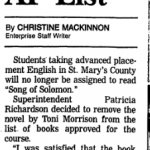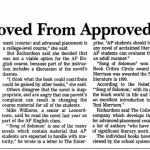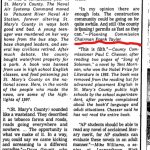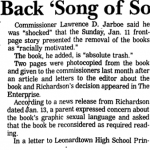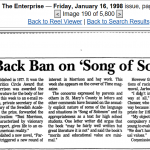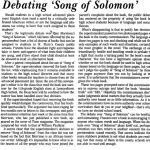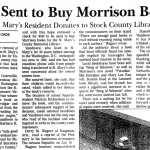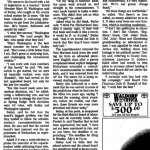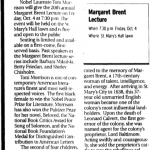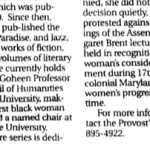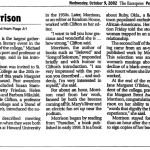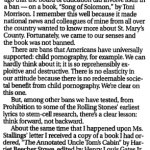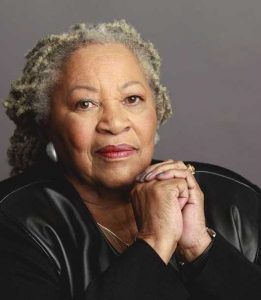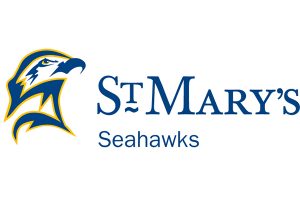Collection of coverage from The Enterprise.
These articles are written by staff writers instead of letters from the public to the editor.
Christine Mackinnon is a staff writer for The Enterprise. This article includes a quote from superintendent Patricia Richardson on her decision to remove the novel Song of Solomon by Toni Morrison. “I was satisfied that the book was not appropriate for high school students” – Richardson. Richardson overturned the decision of a committee of parents and educators to keep the book on the list of those that may be assigned for AP English classes.
The article goes on to summarize the initial complaint to Leonardtown High School. An 11th grade student complained about the content in Song of Solomon to his mother Bernadette Williamson. She then wrote to the principle of Leonardtown High, Edward Weiland. “I too have read this book and have come to the conclusion that it most definitely is not an appropriate book for high school students.”
When parents complain about a book school policy dictates that a committee is appointed to review the book and make a recommendation to the superintendent. The committee’s determination was ignored and the book was removed.
- 12 December 1997 Part 1
- 12 December 1997 Part 2
(Part 1: “Book Removed From AP List” By: CHRISTINE MACKINNON (Enterprise Staff Writer) “Students taking advanced placement English in St. Mary’s County will no longer be assigned to read “Song of Solomon” Superintendent Patrica Richardson decided to remove the novel by Toni Morrison from the list of books approved for the course. ‘I was satisfied that the book was not appropriate for high school students,’ said Richardson, who overturned the recommendation of a committee of parents and educators to keep the book on the list of those that may be assigned by AP English teachers. Richardson emphasized that students are not prohibited from read-“) (See SONG, Page A-8)
(Part 2: “-ing the book, only that it will not be used as a textbook “When you use a book as a textbook, you have a captive audience,” she said. This year a student in the 11th-grade AP English class at Leonardtown High School commented to his mother about the novel’s use of foul language and explicit sexual descriptions Students were assigned to read the book and “The Adventures of Huckleberry Finn” by Mark Twain. ‘To be honest, he labeled the book as ‘trash’ ‘ the student’s mother, Bernadette Williamson, wrote a letter to Leonardtown High School principal Edward Weiland ‘I too have read this book and have come to the conclusion that it most definitely is not an appropriate book for high school students’ Under school policy, when a parent complains about a textbook, a committee is appointed to review the book and make a recommendation to the superintendent. Committee members include the principal of the school, the department chairman, the subject area supervisor of instruction, and two people appointed by the County Council of Parent-Teacher Associations. The committee formed to review ‘Song of Solomon’ recommended that the book should remain on the list. Parents have the option, in any class, to request their child be given a different textbook or assignment if they find the course material to be offensive, said Donna Nored, supervisor of instruction for English and language arts. ‘The book is for the advanced placement (course) and advanced placement is a college-level course,’ she said. But Richardson said she decided that was not a viable option for the AP English course, because part of the instruction includes a discussion of the novel’s themes. ‘I think what the book could contribute could be gained by other books,’ she said. Others disagree that the novel is inappropriate, and are angry that one parent’s complaint can result in changing the course material for all of the students. Mike Williams, a senior at Leonardtown, said he read the novel last year as part of the AP English Class. ‘Song of Solomon’ is one of the many novels which contain material that AP students are expected to handle with maturity,’ he wrote a letter to The Enterprise. ‘AP students should be able to read any novel of acclaimed literary merit, for AP students can evaluate these novels in an adult manner.’ ‘Song of Solomon’ won the National Book Critics Circle award in 1997, and Morrison was awarded the Nobel Prize in literature in 1993. According to the Nobel Foundation, ”Song of Solomon,’ with its description of the black world in life and legend, forms an excellent introduction to the work of Toni Morrison.’ Richardson said The College Board, the company which develops the curriculum for advanced placement courses, provided a list of authors ‘who have written work of significant literary merit.’ The individual books have not been reviewed by the school system, she said. ‘This spring we will have a review of all the books on the AP list,’ she said. Kevin Gonzalez, a spokesman for the company, said the list includes more than 200 books from which teachers can select. ‘Some are classics, some have been added… when we opened it up to people only recently recognized by the mainstream,’ he said. Gonzales said Morrison was one of the authors added recently, as the company made a conscious effort to include women and minority authors. He said removing one book from the list would not affect a student’s performance on the AP test, which allows students to get college credit. ‘There’s no way he could have a test on all 200 books on the list,’ he said. ‘None of these are mandatory.’)
Mackinnon, Christine. “Book Removed From AP List” The Enterprise, December 12, 1997.
(“HE SAID, SHE SAID” 1997 Summed Up in Quotes… “‘This is filth.’-County Commissioner Paul C. Chesser, after reading two pages of ‘Song of Solomon,’ a novel by Toni Morrison, who won the Nobel Prize for Literature in 1993. The book was removed from the reading list for advanced placement English in St. Mary’s County public high schools by the superintendent, after parents complained about the book’s language and adult situations. Chesser said he has not read the entire book. ‘AP students should be able to read any novel of acclaimed literary merit, for AP students can evaluate these novels in an adult manner.’- Mike Williams, a senior at Leonardtown High School, in a letter to The Enterprise supporting the use of ‘Song of Solomon’ in AP classes.”)
Editor. “1997 Summed Up in Quotes” The Enterprise, January 2, 1998.
This article sums up the Commissioners support of banning Song of Solomon. The Commissioner was shocked by the pages read. This also sums up previous letters to the editor.
- 16 January 1998 Part 1
- 16 January 1998 Part 2
(Part 1: “COMMISSIONERS BACK ‘SONG OF SOLOMON’ REMOVAL” By: JENNIFER THOMAS DADE Enterprise Staff Writer. The St. Mary’s County commissioners gave a vote of support this week to St. Mary’s County School Superintendent Patricia Richardson, who recently removed ‘Song of Solomon’ from a list of books that teachers can require advanced placement English students to read. The commissioners voted unanimously to have their staff draft a letter to the editor of The Washington Post newspaper protesting a recent article about the removal of ‘Song of Solomon’ by Nobel Prize winner Toni Morrison from the reading list. Commissioner Lawrence D. Jarboe said he was ‘shocked’ that Sunday Jan. 11 front-page story presented the removal of the books as ‘racially motivated.’ The book, he added, is ‘absolute trash.’ Two pages were photocopied from the book and given to the commissioners last month after an article and letters to the editor about the book and Richardson’s decision appeared in The Enterprise. According to a news release from Richardson dated Jan. 13, a parent expressed concern about the book’s graphic sexual language and asked that the book be reconsidered as required reading. In a letter to Leonardtown High School Principal Edward Weiland, Bernadette Williamson, whose son had been assigned to read the novel protested that the book ‘most definitely in not an appropriate book for high school students.’ A committee of school system staff and parents was formed in October to review the use of ‘Song of Solomon’ as required text for 11th-grade AP English. In November the committee recommended the continued use of the book with some changes in how it was taught and with the provision that alternative books be assigned if students of parents objected to ‘Song of Solomon’ Williamson appealed that decision to the superintendent, and Richardson removed ‘Song of Solomon’ from the list, citing its inap-“) (SEE COMMISSIONERS, Page A-9)
(Part 2: “propriateness. ‘The students participating in the class are typically 15 and 16 years old, and are considered as minors, unlike college freshmen who are generally 18 or older,’ the Jan. 13 press release says. Advanced placement English classes are intended to cover the same material and demand, the same work from students as college freshman classes. ‘Song of Solomon’ is widely used in college classes and high school advanced placement classes. The book, about a young middle-class African-American man and his family in Michigan, was published in 1977. It won the National Book Critics Circle Award that year. In 1993 Morrison was awarded the Nobel Prize for literature for the body of her work. Responding this week to an e-mail request, Bo Svensen, private secretary of the permanent secretary of the Swedish Academy which awards the prize, forwarded the official prize motivation ‘Toni Morrison, who in novels characterized by visionary force and poetic import, gives life to an essential aspect of American reality.’ She has just published a new novel, ‘Paradise,’ which has triggered a new round of interest in Morrison and her work. This week she appears on the cover of Time magazine. The concerns expressed by parents and others in St. Mary’s County in letters and other comments have focused on the sexually explicit nature of some of the language and situations in ‘Song of Solomon’ and its appropriateness as a text for high school students. One letter writer did argue that the book ‘may be fairly well written but great literature it is not’ and said the book’s ‘merits and educational value are minimal.’ However the Post article also raises questions of racial motivation in the book’s removal, Jarboe said. ‘I didn’t interpret (the Post article) that way at all’ said Commissioner Paul W. Chesser, who voted in favor of the letter anyway because he felt the book was not appropriate for 11th-graders. ‘My objection was that it was made to be compensatory reading … to an audience too young to evaluate its literary value,’ he said. ‘We don’t have to add problems with sexual values.’ Commission President Barbara R. Thompson said that the two pages she read were so offensive that she not only threw them away, but tore them up so that no one else could read them. None of the commissioners indicated they had read the book. The two pages passed along to them by Richardson were among the most graphic in the book. The book remains available in the three county public high school libraries for students who want to read it, school officials said. The elected members of the school board have made no public comment on the matter.”)
Dade, Jennifer. “Commissioners Back ‘Song of Solomon’ Removal” The Enterprise, January 16, 1998.
(“DEBATING ‘SONG OF SOLOMON’ “Should students in a high school advanced placement English class read a novel by a critically celebrated American writer, or are the language and situations too strong to have that work assigned to these students? That’s the legitimate debate over Toni Morrison’s ‘Song of Solomon,’ which has been removed by the superintendent from a list of dozens of books that can be assigned to students in St. Mary’s County public schools. Parents have the absolute right and responsibility to know and approve of what texts their children are using and if they object their child should at least be allowed to read an alternative book. After a parent complained about the use of ‘Song of Solomon’ the superintendent removed the book from the list, while emphasizing that it remains available to students in the high school libraries and that many of the other books remain for teachers to choose from on the advanced placement list. Since the son of this newspaper’s editor is in the class that read the book last summer for the 11th-grade English class at Leonardtown High School, the focus here will be confined to how the matter has been handled since that decision. If the superintendent hoped that removing the book quickly would dampen the controversy, that has backfired spectacularly. The argument has been raging for two months now in letters to this newspaper, and gathered national attention last week at the same time that Morrison, who has just published a new book, appeared on the cover of Time magazine. The magazine compared her work to that of William Faulkner. It seems clear that the superintendent’s decision to remove ‘Song of Solomon’ from the class list was not based on the fact that Morrison is an African-American writer. Although it’s impossible to know what is in the hearts of all people who may have joined the parent’s complaint about the book, the public debate has centered on the propriety of using the book for high school students because of language and sexual themes. What’s disappointing is that to justify her decision, the superintendent passes on two photocopied pages of the book to the county commissioners. The language of those two pages is raw and shocking and while not the only examples of such words and situation, certainly the most graphic in the novel. The exchange of extraordinarily hostile and insulting words is prelude to a fight that marks a turning point for the book’s main character. You can have a legitimate opinion about whether or not the book should be used in high school classes based on the language on those pages, but you can’t judge the quality of ‘Song of Solomon’ by those two pages anymore than you can by looking at its cover. It is unfortunate that the commissioners weren’t given the whole book. Those two pages prompted some of the commissioners to express outrage and label the book ‘absolute trash’ and ‘filth.’ Hopefully the commissioners don’t make judgments about matters that they actually have authority over based on so little information. As it is, the commissioners have no more authority over school curriculum than do you or your neighbor- that’s why we have an elected school board. The debate over ‘Song of Solomon’ can be healthy and stimulating. Passion over a book is encouraging to anyone who values words and language. When the debate over ‘Song of Solomon’ plays itself out, perhaps attention can return to another concern the superintendent raised recently. Test scores indicate the more stubborn problem is not what students are reading, but that may have them in the county school are not able to read well enough”)
Porter, Robert & Editorial Staff. “How Can We Expect Education if We Do Not Allow Education? & Debating ‘Song of Solomon’ ” The Enterprise, January 21, 1998.
(“$100 SENT TO BUY MORRISON BOOKS” by: JENNIFER THOMAS DADE (Enterprise staff writer) “Embarrassed by the removal of ‘Song of Solomon’ from St. Mary’s public schools’ reading list for English classes, a former county resident has helped make that book and others by Toni Morrison more accessible to readers. Leslie Vandivere, of Centreville, Va., read with ‘tremendous dismay’ an article in The Washington Post on Jan. 18 about how the St. Mary’s County commissioners ‘denounced this Pulitzer Prize winner and Nobel Laureate’s book as trash, repulsive and vulgar and concurred in its removal from the advanced placement reading list after placement reading list after reading only two pages,’ states a letter from Vandivere to Commission President Barbara R. Thompson. She continues that the ‘only good that may come of this embarrassing episode is that demand for Ms. Morrison’s fine works of literature will increase in St. Mary’s County,’ and with this hope enclosed a check for $100 to be used to buy Morrison books for the St. Mary’s County Memorial Library. Vandivere, who lived in St. Mary’s for 20 years before moving to the Washington, D.C., metropolitan area in 1992, said she has had countless phone calls from people being transferred to St. Mary’s who were concerned about the school system here. She assured them, she said, that their children would be well educated, which added to her dismay at the book’s removal. The decision of school Superintendent Patricia Richardson to remove the book, and the commissioners’ subsequent support of her decision, made national headlines and Vandivere was not the only one who read of the incident and was inspired to write to the county commissioners. Derry M. Wagner of Kingman, Ariz., read a reprint of the Post story in his hometown newspaper, The Arizona Republic, on Jan 19 Wagner, however, congratulated the commissioners on their stand. ‘There are enough good books to read without exposing young minds to such authors,’ Wagner wrote. All the publicity about a book that local officials found too sexually explicit for teen-agers has sparked local interest in the novel. Local bookstores have been selling out of ‘Song of Solomon,’ as well as Morrison’s new novel ‘Paradise,’ like hotcakes and Mary Lee Russell, branch head at the Leonardtown library, said her branch has seen a significant increase in requests for ‘Song of Solomon’ since the controversy started last fall. There was a waiting list for the novel until recently when additional copies were received, she said. Russell said she understood that Vandivere’s donation would be used to buy Morrison books to be distributed among the three branched of the county library system. The commissioners this week responded to Vandivere’s letter, thanking her for her contribution while adding that they stand behind their decision to support Richardson ‘despite repeated attempts by members of the media and the public to portray this decision as one based on racial bias rather than a sense of good taste and a differentiation between that which is contextually vital to a story time and that which is straightforward sexually explicit and borderline pornographic material.'”)
Dade, Jennifer. “$100 Sent to Buy Morrison Books” The Enterprise, February 6, 1998.
(“BAILEY SEEKS 4 MORE YEARS ON ST. MARY’S SCHOOL BOARD
Editor. “Bailey Seeks 4 More Years On St. Mary’s School Board” The Enterprise, June 17, 1998.
(“NOBEL PRIZE WINNER TO GIVE MARGARET BRENT LECTURE Nobel Laureate Toni Morrison will give the 20th annual Margaret Brent Lecture on Friday, Oct 4 at 7:30 p.m. The event will be held on the St. Mary’s Hall lawn and is free and open to the public. Seating is limited and available on a first-served basis. Past speakers in the Margaret Brent lecture series include Barbara Mikulski, Betty Friedan, and Shirley Chisholm. Toni Morrison is one of contemporary American literature’s finest and most well-respected voices. The first black female to win the Nobel Peace Prize for Literature Morrison has also won the Pulitzer Prize for her novel, Beloved, the National Book Critics Award for Song of Solomon, and the National Book Foundation’s Medal for Distinguished Contribution to American Letters. The second of four children, Toni Morrison earned a bachelor’s degree in English from Howard University in Washington D.C., and a master’s degree from Cornell University in Ithaca, NY. She began her career as an educator and English professor, while raising two sons and nurturing her love of writing. What started out as a short story for a writer’s group because her first novel, The Bluest Eye, which was published in 1970. Since then, Morrison has published the novels Sula, Paradise, and Jazz, among other works of fiction, es-says, and volumes of literary criticism. She currently holds the Robert F. Goheen Professor in the Council of Humanities at Princeton University, making her the first black woman writer to hold a named chair at an Ivy League University…”)
Editor. “Nobel Prize Winner to give Margaret Brent Lecture” The Enterprise, February 27, 2002.
(“MORRISON” “‘This is the largest gathering for a literary event in the history of the college,’ Michael Glaser, a poet and professor at the college, said in his introduction. Morrison was invited to St. Mary’s College as the 20th recipient of this year’s Margaret Brent Award. Past awardees have included Susan Stamberg, Betty Friedan, Helen Thomas and Barbra Mikulski. Lucille Clifton, a professor at the college and a friend of Morrison’s, introduced the author. She described meeting Morrison when they were both students at Howard University in the 1950’s. Later, Morrison, as an editor at Random House, worked with Clifton as her editor. ‘I want to tell you how gracious and wonderful she is… how strong.’ Clifton said. Morrison, the author of books such as ‘Beloved’ and ‘Song of Solomon,’ responded briefly and with humor to Clifton’s introduction. ‘I am very impressed with the person you described… and suddenly, i’m very interested in myself,’ she said. For about an hour, Morrison read from her work, fanned by both the breezes coming off St. Mary’s River and an electric fan set up near the podium. Morrison began by reading from ‘Paradise,’ a book published in early 1998. It is a book about Ruby, Okla., a fictional town populated exclusively by African-Americans. Her selection Friday told the story of a woman trapped in an abusive relationship. The second half of the reading came from an as-yet un-published work by Morrison. This selection was an older woman’s musings about the decline of a black-owned sea side resort where she lived and worked. At the end of the reading, Jane Margaret O’Brien, President of the college, presented the Margaret Brent Award to Morrison, congratulating Morrison on her ability to create ‘words that dignify the human experience,’ she said. Morrison stayed for more than an hour after the reading to sign copies of her books.”)
Editor. “Morrison” The Enterprise, October 9, 2002.
Editor. “Feb. 22 Lecture to feature history we need to know” The Enterprise, February 22, 2007.
- 12 December 1997 Part 1
- 12 December 1997 Part 2
- 2 January 1998
- 16 January 1998 Part 1
- 16 January 1998 Part 2
- 21 January 1998 Part 1
- 6 February 1998
- 17 June 1998
- 27 September 2002
- 27 February 2002
- 22 February 2007
Digitized version of The Enterprise



